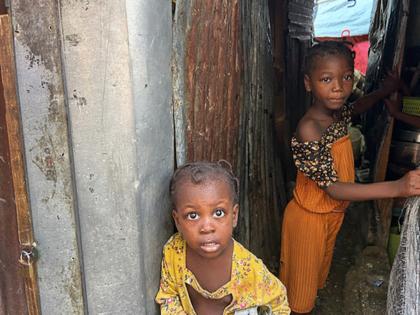UN: Kids in Haiti losing childhood amid displacements, hunger, violence
Published in News & Features
The number of children uprooted by Haiti’s spiraling gang violence has nearly doubled in the last year to 680,000, while those in need of humanitarian assistance now stands at just under a quarter of the country’s estimated 12 million population.
Meanwhile, with more than 1,600 schools directly affected by the violence – including 1,080 that were closed this year either because of armed groups or because they were taken over by those fleeing them – one in four children are now out of school, the United Nations leading child welfare agency, UNICEF, said in a new report.
“It’s fast-escalating, emergencies, and the numbers are of utmost concern,” Roberto Benes, UNICEF’s regional director for Latin America and the Caribbean, told the Miami Herald as he arrived in Haiti earlier this week to see the complex humanitarian disaster for himself. “Now we have 680,000 children forced to flee their homes. We have entire generations at stake.”
Haiti’s crisis, the report says, is not rooted in a single event but in decades of shocks and chronic instability. However, as armed groups continue to spread violence and hold entire communities hostage, children are bearing the brunt, facing increased hunger and malnutrition, displacement, forced recruitment by armed groups and rapes and abductions.
“Haiti is facing a polycrisis, in which the collapse of one sector exacerbates the next: malnutrition worsens as health services falter, choler spreads in displacement sites without safe water, and the disruption of education leaves children more vulnerable to recruitment and exploitation,” he said “The combined impact has devastating consequences for children.”
The 16-page UNICEF Child Alert report draws on the latest data, field reports and analyses. It provides a snapshot of the unprecedented threats children face and outlines urgent action required to ensure their protection and access to nutrition, healthcare, water, sanitation, education and other essential services.
“This situation is getting more concerning,” said Benes, adding that the organization is also concerned about the deterioration of child rights in Haiti and “the grave violations in violence against children.”
Benes said UNICEF wants “to tell the global community, the donor community, the time to invest in Haiti is now.”
Last year, 3 million Haitian children were in need of some kind of humanitarian need. Today, the number is more than 3.3 million. Compounding this is displacement, with children accounting for half of the 1.3 million Haitians who have been forced out of their homes by gangs. At the same time, the report notes that an estimated 1 in 4 adults is living in neighborhoods controlled by armed groups.
As the numbers spike and the violence spreads, basic services such as healthcare are collapsing, and humanitarian access is increasingly being restricted by gangs, the report stresses.
“Children in Haiti are experiencing violence and displacement at a terrifying scale,” said Catherine Russell, UNICE’s executive director, in a statement. “Each time they are forced to flee, they lose not only their homes but also their chance to go to school, and simply to be children.”
With nearly 250 displacement sites sprung up nationwide, more than a third lack basic protection infrastructure, leaving children and women at heightened risk of violence, exploitation and abuse. Schools often double as shelters, further disrupting education for nearly half a million students.
Malnutrition and hunger are also on the rise as armed groups increasingly target children for recruitment into their ranks, and many are victimized by sexual violence and abduction.
UNICEF is calling on the international community to prioritize Haiti’s children and to act with the urgency and scale that the crisis demands. It also calls for a restoration and protection of humanitarian access and basic services; increased funding to address the humanitarian needs; protection and support for children who are displaced and investments in long-term programs focused on children.
The report’s release comes as the U.N. faces one of its biggest financial crises in decades, and as donors cancel or hold back funds to both its agencies and Haiti.
Despite the cuts, the agency has tried to support programs for those affected by the violence, like providing drinking water in displacement camps to counter a resurgence in water-borne cholera and to pay for skills-building programs for children.
One such program was on the itinerary last month during the visit of U.N.’s humanitarian chief Tom Fletcher. During a tour of the youth center in Port-au-Prince, Fletcher observed young men learning to repair motorcycles and girls being trained in cosmetology. Elsewhere younger kids were making belts and sandals.
“Here is a place that inspires hope,” he said after hearing from two young women about how they had been forced to flee for their lives. “It encourages me to believe that we can find ways to push back against this crisis, against this sense of despair and deterioration because here, these young people are ...rebuilding their lives.. They are finding ways to get over the trauma they’ve been true.”
Geeta Narayan, UNICEF’s country director for Haiti, said more of these programs are needed in the Caribbean nation.
“Even getting that child out of the camp or wherever they’ve been displaced… for a few hours, I think, is tremendous,” she said. “You’re giving them an opportunity to be a child again, to have fun, to laugh and be with their peers, and do something creative.
“I think that is one measure of success. I think a second measure of success is, what does that exposure do for the child in the medium term? Does it inspire her, for example, to go back to school?” she said. “They have so much potential and drive and capabilities if they are given the opportunity.”
©2025 Miami Herald. Visit at miamiherald.com. Distributed by Tribune Content Agency, LLC.







Comments